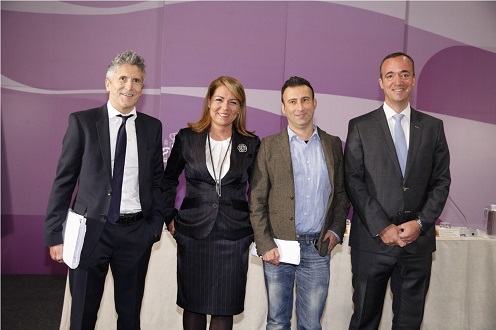The Government steps up its fight against discrimination based on sexual orientation and gender identity with the creation of an Observatory
News - 2015.5.6
In his speech, Francisco Martínez referred to the Armed Forces' Protocol for Action against hate crimes which the Ministry for Home Affairs implemented in December 2014, It has three main aims: to increase the visibility of hate crimes, focusing attention on the defence of those most vulnerable; to construct an extensive human chain of professionals so that society as a whole can collaborate actively in assisting victims of hate crimes; and to report and identify the discourse of hate that generates physical, psychological and verbal violence with a view to eradicating it. "The discourse of hate", he said, "is the clearest manifestation of cowardice and strikes against human dignity. That is why our policy is one of zero tolerance."
Francisco Martínez explained that this protocol reviews the different types of conduct that violate the criminal and administrative codes, as well as the presence of indicators of polarisation linked to hate crimes. These indicators constitute evidence that should be duly complied with and incorporated into the police report, in order to provide public prosecutors and judges with sufficient and reasonable indications of crime and allow charges to be filed and, where appropriate, sentences to be issued. He also stressed that police action in the case of these crimes is reviewed in each of the procedural phases to improve the way victims are treated and improve the reports submitted to the judicial authorities and the Public Prosecutor's Office.
Specialised training for 20,000 members of the police and Guardia Civil
The State Secretary for Security has highlighted that Spain is among the five countries that compile data for a hate crimes register. According to Francisco Martínez, the process of collecting the data on racism and related matters is now complete thanks to the specialised training received by 20,000 members of the law enforcement authorities to identify and compile these kinds of crimes.
Francisco Martínez referred to data from the 2014 Report on hate crimes in Spain that was recently presented by the Minister for Foreign Affairs, Jorge Fernández Díaz. According to this report, 65.6% of a total of 1,285 hate crimes registered in Spain were cleared up in 2014.
Specifically, 843 cases were resolved and 512 people were arrested or prosecuted for crimes against sexual orientation and identity, racism/xenophobia, disability, crimes against religious belief or practice, anti-Semitism and hatred of the poor. Martínez highlighted that the main priority of the Ministry of Home Affairs is to discover the real number of hate crimes that take place in Spain in order to "be able to defend and protect its victims". He therefore urged everyone who has at any time suffered a crime of this type to report it to the authorities, while stressing the importance for victims trusting in the law enforcement authorities.
Observatory against discrimination
The State Secretary for Social Services and Equality, Susana Camarero, highlighted that this new initiative for an observatory "will serve to consolidate and defend the rights of people whatever their sexual orientation or gender," and to "promote values such as respect for diversity and the free development of people."
After noting Spain's pioneering role due to its work on analysis, which is giving rise to a statistical and information flow that is unprecedented in Europe, Susana Camarero has valued the importance of coordination between administrations, between the ministries of Home Affairs and Health, Social Services and Equality and between these ministerial departments and social organisations which have the best knowledge of the situation on the ground. All this, she said, is the "result of a joint commitment" with respect to the priority for defending citizens' rights and freedoms.
The Observatory presented on Wednesday will have a website and a mobile phone app available starting this summer. It will provide a rapid response system for people who suffer from or witness situations of discrimination. While recalling that "being a homosexual or transsexual is one of the main reasons for which hate crimes are committed," according to the Annual Report published recently by the Ministry for Home Affairs, Susana Camarero has pointed to the importance of formal complaints, urging people to file reports, as only 9.1% of victims of discrimination or intolerance do so.
For this reason, the State Secretary highlighted some of the measures that the Department is implementing, such as resource guides with information on what action to take, and awareness raising campaigns in education, as is the case of "YosoyTú" - "IamYou", which the Directorate for Equality is promoting in schools and colleges across Spain.





